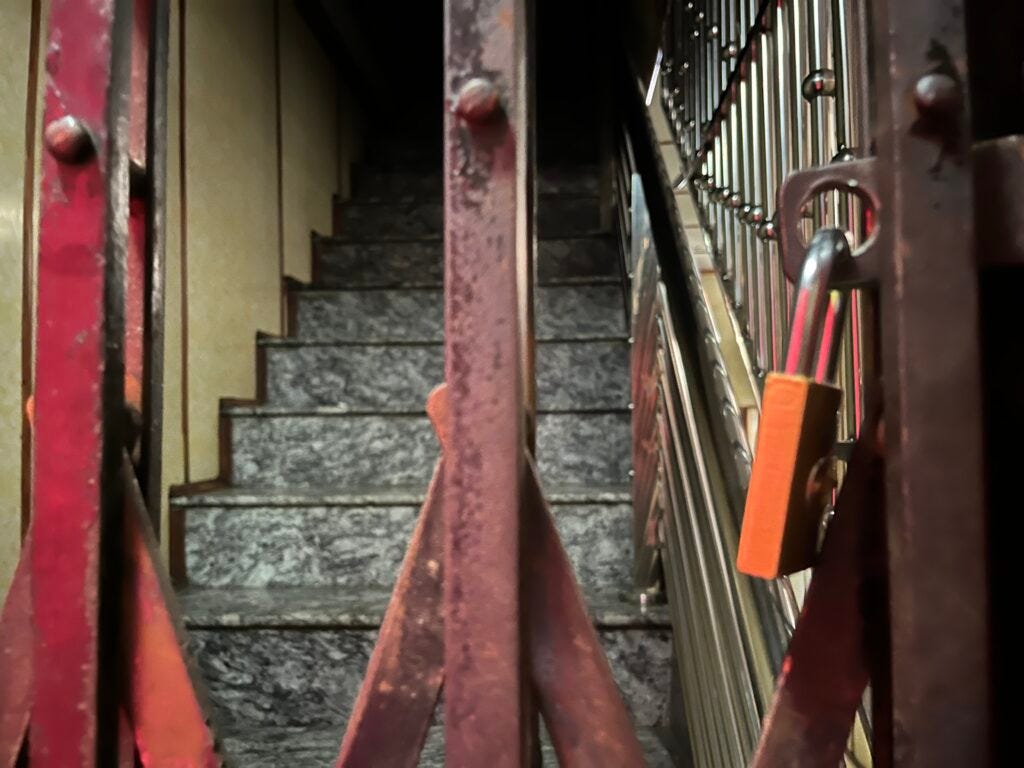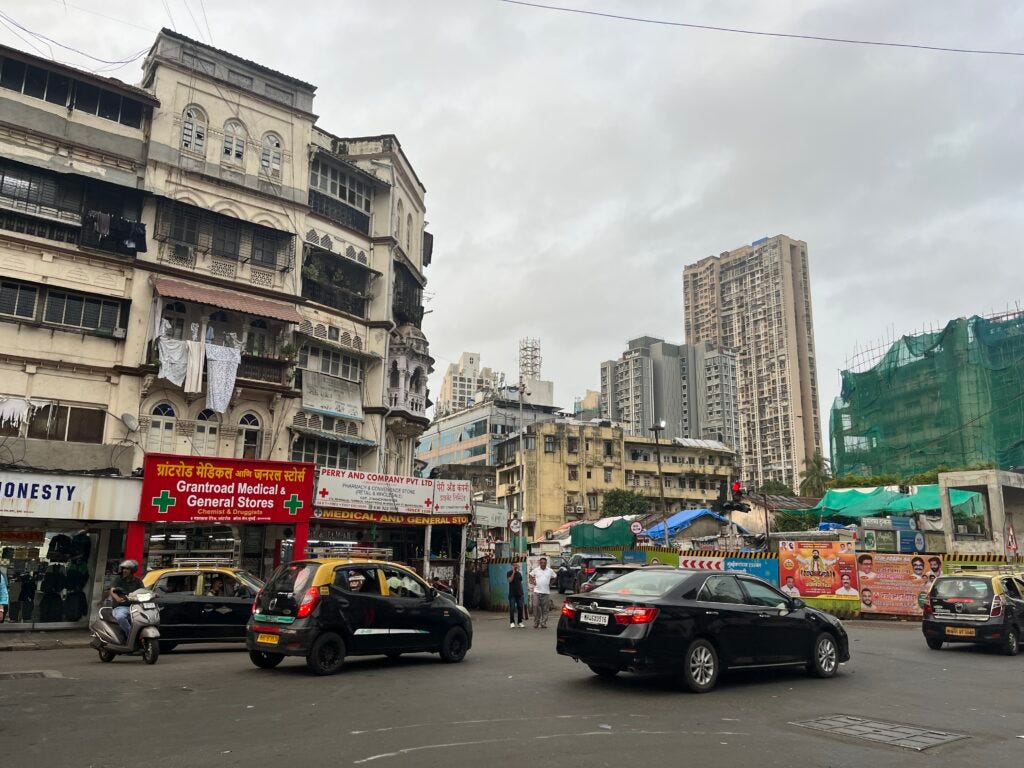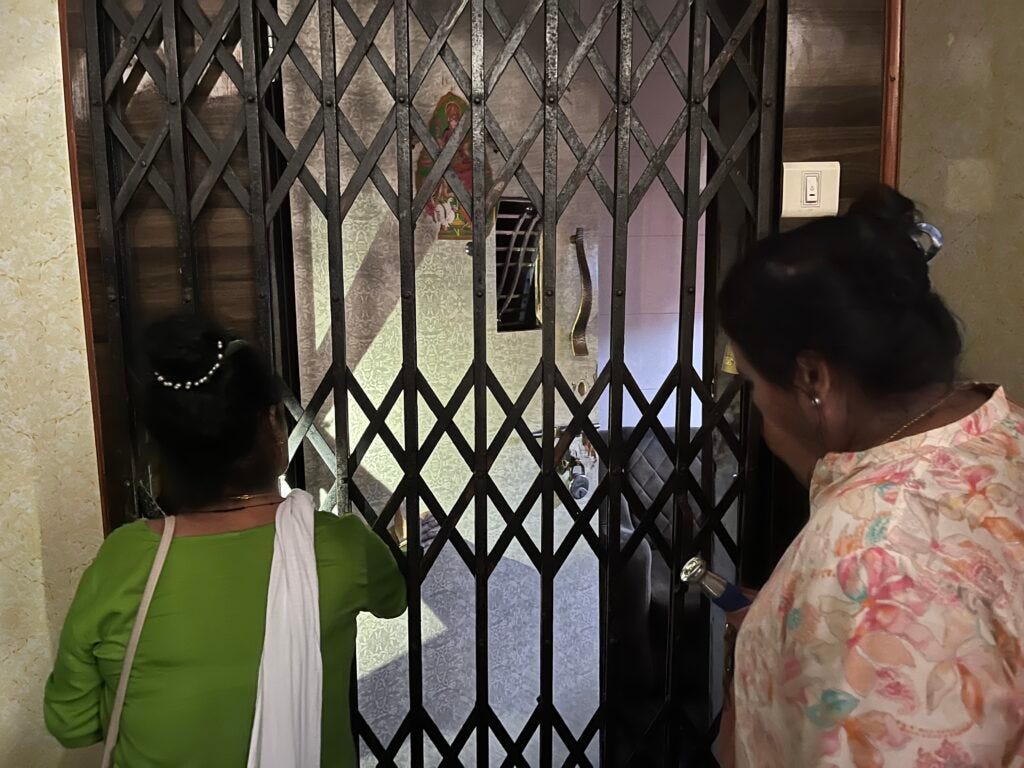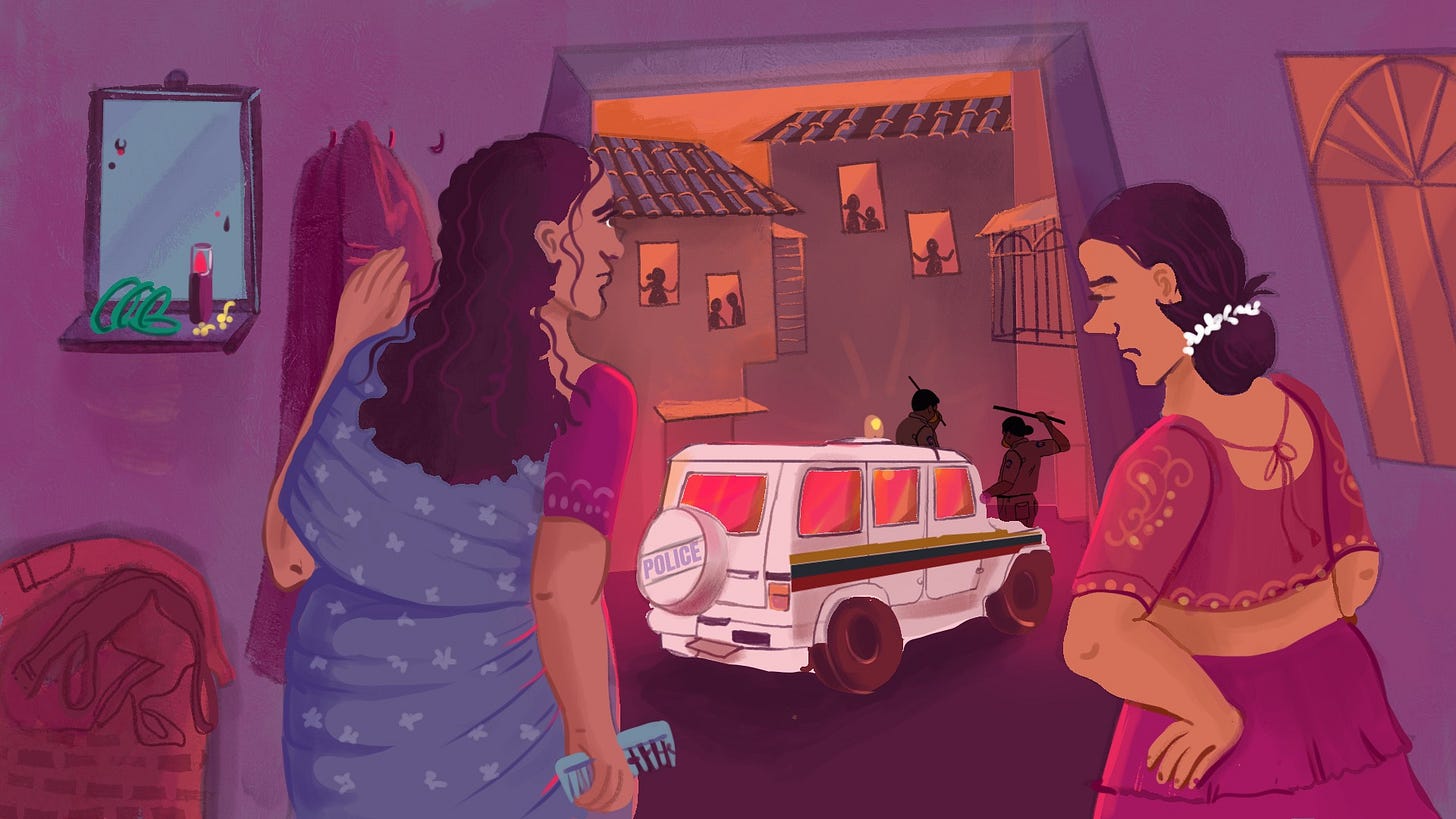‘Raids Meant To Scare Us Into Leaving, Clear Kamathipura For Redevelopment’: Sex Workers
Mumbai’s historic red light district sits in a premium locality and the sex workers who live and work here have no documents to establish ownership of property
Evenings in Kamathipura are thick with fear these days. For Rani and hundreds of sex workers in the area, the sound of a police van and the shouts of the constables cut through the area’s bustle like an everpresent threat.
Most lanes of Kamathipura, south Mumbai’s historic red-light district, are now eerily silent and deserted, as they were in the pandemic. All the brothels have been shut by the city police, pushing women to economic hardships and high debts, sex workers and their collectives told us.
On June 20, Mumbai Police raided the brothels in the area and “rescued” 44 women sex workers. All have been sent to Navjeevan Sudhar Grih in Deonar for “rehabilitation”. Among them were three Bangladeshi women, alleged the DB Marg police.
More than a dozen sex workers BehanBox interviewed maintained that these police raids have become more frequent over the last two years. Asha Darpan, a community-based organisation for sexworkers and Astha Parivar, a non profit, alleged that the spike in these raids is meant to terrify sex workers into leaving Kamathipura to clear the path for the state government’s redevelopment project for the area announced last month.
“In Kamathipura, 17 lanes serving as workspaces for sex workers have now been reduced to four. No one knows where these women go and how they live. The government has no record and the police action sex workers everywhere, not just Kamathipura because builders are lobbying to redevelop the area,” said Tejaswi Sevekari, who runs a collective of sex workers in Pune. “Not only Kamathipura, most red light areas in Maharashtra sit on prime land with immense real estate value.”
Nearly 3,000 sex workers of Kamathipura have been affected by the police crackdown, according to the activists of Asha Darpan and Astha Parivar. Not all of them live here, more than 1000 live on the city’s periphery and travel here everyday.
What adds to fears of eviction is the precedent of Bhadrakali, the red light area of Nashik. Last year, it too saw frequent raids on sex workers who felt pressured into leaving their settlements. Now small shops or tapris have taken their place, a likely precursor to its redevelopment, as we detail later. The Hardasi basti (Gandhilpura red light area) of Anmalner city in Jalgaon district of north Maharashtra too is being similarly threatened, according to the news report by BBC Marathi.
The land acquisition process is yet to begin in Kamathipura, only tenders have been floated. But it is clear that the sex workers of the area will be even more vulnerable than before – like other marginalised people, they do not possess any documents to establish their ownership of the properties they inhabit. This means that they will not only lose their homes but also not be eligible for rehabilitation. Unions and activists are demanding that when Kamathipura is redeveloped, the sex workers who lived and worked here must be rehabilitated under Slum Rehabilitation Authority (SRA) and Maharashtra Housing and Development Authority (MHADA) schemes.

“Redevelopment, for sometime, has served as a means to convert public land into private property rather than genuinely improve the quality of life for the marginalized in Mumbai. The question of eligibility – who qualifies for rehabilitation housing and who doesn’t—is at the heart of this issue. This disproportionately harms the most marginalised communities that lack documents regarding their ownership. Kamathipura is not only about sex workers but they are among the most vulnerable, as their work is unrecognised and criminalised by the law, making it easier for the system to deny them eligibility as legitimate residents,” said Smruti Koppikar, founder editor of the online journal, Question of Cities, who has reported on urban development for over three decades.
Living In The Dark
Police have sealed more than a dozen brothels in ‘Dinesh’ and ‘Rele’ buildings in Kamathipura. As we said earlier, all the brothels in the area have reportedly been shut for more than a month. Police patrols the area every afternoon and evening to ensure that women do not stand around outside to solicit clients. If seen on the road for purposes other than shopping or going for a walk, they are questioned and asked to return.
Around 500 agitated women sex workers protested against crackdown on brothels at Azad Maidan on July 16.
Rani*, a sex worker who migrated here from Kolkata, recalled the raid on her room. “When the police came, they vandalised our room, took away our belongings such as cash, golden-silver ornaments. They abused us. When the Supreme Court recognises our work why do the police harass us in the name of rescue? As an adult can’t I decide my profession?” she asked.
The sex workers told us that the police are making it impossible to live from one day to the next. Said Parvati* who migrated from Andhra Pradesh nearly 20 years ago: “For more than a month we have been cooking in the dark, with the help of a mobile torch light. If we switch on the lights in the evening, the constables come, scold and force us to switch off the lights. According to the police, switching on the lights means we are serving our clients.”
Sex workers alleged that the police had also been harassing clients and threatening to file cases against them. Monsoon anyway significantly affects their work and this adds to their troubles.

Behanbox reached out to the DB Marg police station on their action which is supposed to have helped “trafficked” victims. We asked them why adult sex workers are not allowed, per the Supreme Court judgement, to work with dignity and privacy when that is their choice.
“We are doing everything within the legal framework,” said the investigation officer in the case. “The SC recognises sex work as a profession, but those who work in a groups [implying large scale rackets] and those who benefit from sex work can be arrested under the Immoral Trafficking Prevention Act. (ITPA).” BehanBox has also emailed a questionnaire to Mohit Garg, Deputy Commissioner of Police (Crime), on instances of human rights violation of sex workers. We are awaiting a response.
The ITPA is a central legislation meant to protect victims of human trafficking, the exploitation of trafficked women in commercial sex work and their rehabilitation. The police use this legal framework against sex workers and take away their agency, maintained activists such as Kiran Deshmukh, Tejaswi Sevekari, and Asawari Deshpande.
The Veshya Annyaymukti Parishad, Sangli and the National Network of Sex Workers have condemned the police action in Kamathipura. “The police should not harass sex workers in the name of ‘rescuing’ trafficked women. Those who are adults and willingly engaged in this profession should be respected like other workers,” said Kiran, a sex worker and leader of Veshya Annyaymukti Parishad, Sangli.
Income Loss, Precarity
Once sex workers are ‘rescued’ by the police under ITPA, they are subject to medical tests and produced in the court. Thereafter, they are sent to Sudhar Grih for at least 21 days, where they are trained for vocational skills such as making papads, pickles, sewing and so on. They are then released after a few months. The brief vocational training does not offer them any avenue for long-term employment and women often return to sex work after a period of struggle. This loss of income often pushes them into poverty and debt.
“During raids, the police falsely implicate some sex workers as traffickers. The accused often end up behind bars and need to pay hefty surety amounts to secure bail, and then there are mounting legal expenses. Many are forced to mortgage their homes or sell off personal belongings. Yet, finding someone willing to stand as surety in court is a challenge because of social stigma,” said a Nagpur-based member of the National Network of Sexworkers who sought anonymity.
The stint in Sudhar Grihs also disrupts the lives of the children of sex workers, affecting their education, care, and overall well-being. While District Child Welfare Committees step in to provide protection and care, the children are separated from their mothers and face emotional and psychological distress.
“Women are taken away without being allowed to gather even their basic belongings. Some are HIV positive and must take their antiretroviral (ART) medication without missing a single dose. In such cases, we rush to collect their medicines from their homes and, after repeated pleas to the authorities, deliver them to the police stations or Sudhar Grihs where the women are kept,” said Devta, an activist of Astha Parivar, a non-profit in Kamathipura.

A research report by the Sampada Gramin Mahila Sanstha (popularly known as SANGRAM) and Veshya Annyaymukti Parishad found the policing of the sex workers to be highly violent. It says: “The impunity with which police inflict violence on sex workers allows other members of the public to do the same.”
“This criminalisation of sex workers is at the heart of all issues connected to their policing,” said Tejaswi Sevekari, an activist who works with sex workers in Pune.
Evictions Becoming Common
As we said earlier, sex workers from the Bhadarakali red light area in Nashik have been evicted from their settlements and now small tapris are being run on the premises.
“There were frequent police raids in Bhadrakali over the past few years. We intervened and eventually the raids did stop but they helped create a narrative against sex workers. Their homes and their workspace were demolished with the support of builders, businessmen, and local residents. Makeshift shops have now come up there, and there will likely be more construction in the future,” said Asawari Deshpande, co-ordinator of Pravara medical trust which works for HIV intervention among sex workers in Nashik.
A similar story emerges in Nagpur’s Ganga Jamuna red light area. “Frequent police raids are carried out in the hope that frustrated women will evict the area by themselves. But women own their houses here so they are resisting,” said a local activist.
There is a precedence to these developments. Large communities of sexworkers were forcibly evicted from their homes in 2002 and 2004 in Nippani, Karnataka and in Baina, Goa in 2004; and the police targeted the hijara-sexworkers community in Bangalore in 2008. In these cases too, the police allegedly harassed sex workers by threatening them with prosecution under ITPA and local regulations.
“When the women from Bhadrakali were scattered after demolition, many of them faced threats to their livelihood and safety. The older women couldn’t relocate or restart their work elsewhere, and began to stand along the highways to solicit customers. Such places don’t offer the safety that brothels do. The police even approached us to identify the dead bodies of some sex workers found on the highways,” Asawari said.
Sex workers in Amalner city of Jalgaon district are also grappling with eviction threats, this time from local residents. The community has grown increasingly hostile, claiming that the presence of sex workers affects the lives of women in their families.
Question of Livelihoods
Of India’s around 1 million female sex workers, 1 lakh are in Maharashtra. Entire families are dependent on their earnings.
“Hamare budhe maa-baap ko toh pata hi nahi hota, ham kya kaam karte hai, ham sirf har mahina paise bhejte hai. Lekin cases ke liye police court me jhooth bolti hai, ki hamare maa baap sab janke bhi paisa kha rahe hai. Ab sach jhooth sabit hone me to barson lagte hain court mein, tab tak hamara kam ka bahot nuksan hota hai (our elderly parents don’t know what kind of work we do, we just send them money every month. But in legal cases, the police lie in court, claiming that our parents are knowingly living off our earnings. Now, proving what’s true or false takes years in court, and by then, we’ve already suffered huge losses in our work),” said Beena* from Kamathipura.
The police and magistrates have been given immense powers under ITPA. Women also alleged that the police demand bribes to keep the news of their ‘rescue’ and ‘rehabilitation’ from their families. They added that they often pay up for fear of upsetting their family and community. The law also empowers the police to search without warrant if they receive information about forced sexwork/trafficking being done.
“Sex workers live with a group of women for safety from violence at the hands of men, police etc. This gives them a sense of solidarity as well as community support,” said Kiran. She also believes that women sex workers should be trained to curb trafficking by the police.






